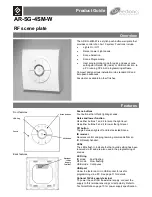
108-032
spim_csx
spim_simo
spim_clk
Transmitter buffer
Shift register
Master
Control
Receiver register
(single)
Control
Shift register
Master SPI shift register
Initial
After 8 spim_clk
clock cycles
WordA
WordC
Slave SPI shift register
Initial
WordB
WordA
After 8 spim_clk
clock cycles
Receiver register
Slave
(receive only)
Preliminary
www.ti.com
Architecture
Transmitter register or FIFO (if use of buffer enabled) content is always loaded in shift register whether
it has been updated or not. The event TX_underflow is activated accordingly, and does not prevent
transmission.
On completion of SPI word transfer (bit EOT of the register MCSPI_CH(I)STAT is set) the received data
is transferred to the channel receive register. This bit is meaningless when using the Buffer for this
channel.
The built-in FIFO is available in this mode and can be configured in one data direction Transmit or
Receive, then the FIFO is seen as a unique FFNBYTE bytes buffer, or it can also be configured in both
data direction Transmit and Receive, then the FIFO is split into two separate FFNBYTE/2 bytes buffer
with their own address space management, in this last case the definition of AEL and AFL levels is
based on FFNBYTE bytes and is under Local Host responsibility.
12.2.4.4 Slave Receive-Only Mode
The slave receive mode is programmable (bits TRM set to 01 in the register (I)CONF).
In receive only mode, the Transmitter register should be loaded before McSPI is selected by an
external SPI master device. Transmitter register or FIFO (if use of buffer enabled) content is always
loaded in shift register whether it has been updated or not. The event TX_underflow is activated
accordingly, and does not prevent transmission.
When an SPI word transfer completes (the SPIm.SPI_CHnSTAT0[2] EOT bit (with n = 0) is set to 1),
the received data is transferred to the channel receive register.
To use McSPI as a slave receive only device with MCSPI_CH(I)CONF[TRM]=00, the user has the
responsibility of the inhibition of the TX_empty and TX_underflow interrupts and DMA write requests
due to the transmitter register sate.
On completion of SPI word transfer (bit EOT of the register MCSPI_CH(I)STAT is set) the received data
is transferred to the channel receive register. This bit is meaningless when using the Buffer for this
channel. The built-in FIFO is available in this mode and can be configured with FFER bit field in the
MCSPI_CH(I)CONF register, then the FIFO is seen as a unique FFNBYTE bytes buffer.
shows an example of a half-duplex system with a master device on the left and a
receive-only slave device on the right. Each time a bit transfers out from the master, 1 bit transfers in
from the slave. After eight cycles of the serial clock spim_clk, Word A transfers from the master to the
slave.
Figure 12-23. SPI Half-Duplex Transmission (Receive-Only Slave)
1243
SPRUGX9 – 15 April 2011
Multichannel Serial Port Interface (McSPI)
© 2011, Texas Instruments Incorporated
Содержание TMS320C6A816 Series
Страница 2: ...Preliminary 2 SPRUGX9 15 April 2011 Submit Documentation Feedback 2011 Texas Instruments Incorporated...
Страница 92: ...92 Read This First SPRUGX9 15 April 2011 Submit Documentation Feedback 2011 Texas Instruments Incorporated...
Страница 1122: ...1122 Multichannel Audio Serial Port McASP SPRUGX9 15 April 2011 Submit Documentation Feedback 2011 Texas Instruments Incorporated...
Страница 1562: ...1562 Real Time Clock RTC SPRUGX9 15 April 2011 Submit Documentation Feedback 2011 Texas Instruments Incorporated...
Страница 1658: ...1658 Timers SPRUGX9 15 April 2011 Submit Documentation Feedback 2011 Texas Instruments Incorporated...
Страница 1750: ...1750 UART IrDA CIR Module SPRUGX9 15 April 2011 Submit Documentation Feedback 2011 Texas Instruments Incorporated...
Страница 1984: ...1984 Universal Serial Bus USB SPRUGX9 15 April 2011 Submit Documentation Feedback 2011 Texas Instruments Incorporated...
















































